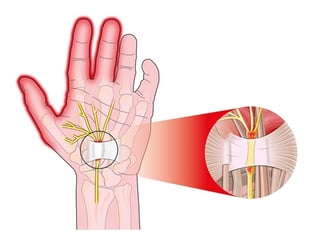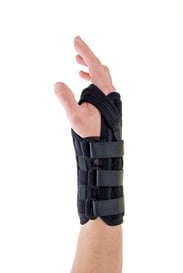What is Carpal Tunnel Syndrome? (Signs and Symptoms)
March 28th, 2016 | 3 min. read

 Carpal tunnel syndrome is a common neurological problem for people of all ages and activity levels. Learning to identify its causes, signs, and symptoms is key to preventing further nerve damage and the need for surgical intervention.
Carpal tunnel syndrome is a common neurological problem for people of all ages and activity levels. Learning to identify its causes, signs, and symptoms is key to preventing further nerve damage and the need for surgical intervention.
What is Carpal Tunnel Syndrome (CTS)?
Carpal tun nel syndrome (CTS) is the result of regular, repetitive pressure that's placed on the nerve which runs from the forearm into the palm.
nel syndrome (CTS) is the result of regular, repetitive pressure that's placed on the nerve which runs from the forearm into the palm.
This nerve, called the median nerve, is what controls the sensations of the hand that occur on the palm side of the thumb and fingers (except for the little finger). It also directs nerve impulses to the hand's smaller muscles, which operate the movement of the fingers and thumb.
The carpal "tunnel" is itself a narrow space through which the nerve directs these impulses. Over the top of this space, a short, tight ligament that connects the muscular tissue on both sides of the palm also protects the nerve.
If the tendons in the wrist and hand become irritated or swell, they can compress the ligament which, in turn, compresses the median nerve. This is also median nerve entrapment.
The result? Sharp pain that radiates up the arm from the wrist, as well as weakness in the hand and wrist, and numbness, especially in the thumb.
The causes of carpal tunnel syndrome
There is usually more than one reason for determining what causes CTS:
-
Heredity. This is a problem that can run in families.
-
Repetitive motion. Tasks like typing, grasping heavy objects, using video game controls, playing musical instruments, throwing a baseball, and repairing watches or jewelry are just some examples of repetitive motion activities that can lead to the development of CTS.
-
Pregnancy. Tissues in a mother's body carry more fluid than normal, which means they are more likely to swell, which can lead to wrist discomfort.
-
Age. Older people more commonly have CTS because their joints have experienced more wear and tear.
-
Medical conditions: Rheumatoid arthritis, thyroid gland imbalance, diabetes, and other conditions of metabolism can all play a role in the development of carpal tunnel pain.
-
Gender. More women that men tend to suffer from carpal tunnel pain.
Signs and symptoms of carpal tunnel syndrome
The following are signs you need to consult an orthopedic specialist.
-
CTS starts classically with a "numb thumb," as well as tingling in the wrist, fingers, and thumb.
-
Weakness, nu
 mbness, tingling, or pain in the hands while gripping a steering wheel, riding a bicycle, holding a cell phone, or reading a book or newspaper, is a sign you might have CTS.
mbness, tingling, or pain in the hands while gripping a steering wheel, riding a bicycle, holding a cell phone, or reading a book or newspaper, is a sign you might have CTS. -
Hand and wrist pain that occurs at night and which awakens you from sleep may indicate CTS.
-
Sharp, electrical pains like lightning bolts may shoot up the forearm from points that originate in the wrist any time that the whole arm is extended or stretched.
-
If you notice you are dropping objects, it may be due to untreated carpal tunnel syndrome causing weakness in the thumb, making it hard to grasp things.

Treatment for carpal tunnel syndrome
Carpal tunnel relief and prevention
Give your wrists a break. Frequently changing hands while working on something repetitive can help, as can taking small rests between tasks or mindfully changing activities at the first sign of pain or fatigue.
An orthopedist can show you some mild exercises specific to carpal tunnel pain that can offer some relief and help to keep your symptoms from worsening.
Use of a keyboard wrist support for long days of typing at the computer can help provide proper ergonomic alignment of the wrists so that the median nerve does not become compressed.
Wearing a splint (see picture) can provide support to the wrist during activities that might strain the hand or fingers. It can also help control swelling at night while you sleep, offering some pain relief.
Lose a little weight. Sometimes a few added pounds can place pressure on the carpal tunnel, leading to its compression.
With more severe cases of carpal tunnel syndrome, temporary treatments of corticosteroid injections can help, but there's a limit to how many you can have before it becomes necessary to consider surgery.
Carpal tunnel  release surgery
release surgery
A doctor can determine if you have CTS and how severe your case is by discussing your symptoms, looking at your medical history, and performing a hand examination.
They may also enlist in electrical tests and take X-rays. If your condition is serious enough, they may recommend release surgery.
This is a very short surgical procedure in which the ligament that is pressing against the median nerve is snipped or "released." Carpal tunnel surgery requires a specific protocol for recovery in order to maintain wrist strength and flexibility following the procedure.
It's recommended that you see a doctor if your symptoms of carpal tunnel syndrome persist or begin to interfere with your daily activities or sleep patterns. Untreated CTS can lead to permanent nerve and muscle damage otherwise.
Sources:
American Academy of Orthopaedic Surgeons
FamilyDoctor.org
Mayo Clinic
MedlinePlus/National Library of Medicine
National Institute of Neurological Disorders and Stroke
Coastal Orthopedics regularly treats patients with carpal tunnel syndrome and our surgeons are experienced in carpal tunnel release procedures. We understand that injuries happen, but they do not have to stand in your way. Please allow us to help with identifying and treating, or even preventing, your wrist pain. Call us today in Corpus Christi at (361) 248-1253.
Article written by: Rob Williams, MD
Dr. Williams has been practicing orthopedic surgery in Corpus Christi since 1998. After graduating from Texas Tech hereceived his medical degree from the University of Texas at San Antonio. At the prestigious Campbell Clinic located at the University of Tennessee, Dr. Williams completed not only an Orthopedic Surgery Residency, but an additional year of Fellowship Training in Spine Surgery. Dr. Williams is dedicated to creating an excellent patient experience in the office or in the surgery suite.

